On a remote Lake Superior island, Miijim is educating guests one fine-dining dish at a time
Even in a major culinary hub, opening a new restaurant is an extremely difficult endeavor. The space is unproven, logistics are overwhelming and there’s no telling how many people will actually show up in those first few weeks. Now, imagine launching a restaurant on a remote island in Lake Superior.
Madeline Island has a population of 430, which swells to around 2,500 during summer’s tourist season. It’s the only inhabited of the 22 Apostle Islands and requires a 20-minute ferry ride to get there. It's not exactly an ideal scenario for any new restaurant owner, but for chef Bryce Stevenson, opening on Madeline Island made all the sense in the world.
Stevenson, an Ojibwe chef, grew up nearby and had long dreamed of opening a restaurant that reflected the culture of the area's original Ojibwe inhabitants who migrated there around 1,500 years ago. According to a prophesy, Gitche Manitou, the Great Spirit, told them to search for and settle at a place "where food grows on water."

Stevenson's hope was for his restaurant to act as a gateway for Indigenous education through the universal experience of dining. He opened his restaurant over Memorial Day weekend, naming it Miijim, the Ojibwe word for “food.”
"We didn’t know what to expect when we opened,” Stevenson said. “We’re a specialty restaurant on an island, and it’s kind of a trip to get here. So the fact that we’ve been as busy as we have and to have the reception that we’ve had is amazing.”
Stevenson has heard from guests that they traveled to Madeline Island specifically to dine at his restaurant. “I think we’ve been boosting the ferry business just from the people coming in,” he said, noting that visitors have come all the way from Minneapolis, Chicago and Milwaukee to try his food.
People like me.
I traveled from Milwaukee to Miijim near the end of August to check out the menu and learn more about the mission behind it. And after my dining experience — six-hour drive, ferry ride over and all — I left the restaurant with a single sentiment: nimiigwechiwendam (I am grateful).
Food as 'Ojibwe medicine' at Miijim
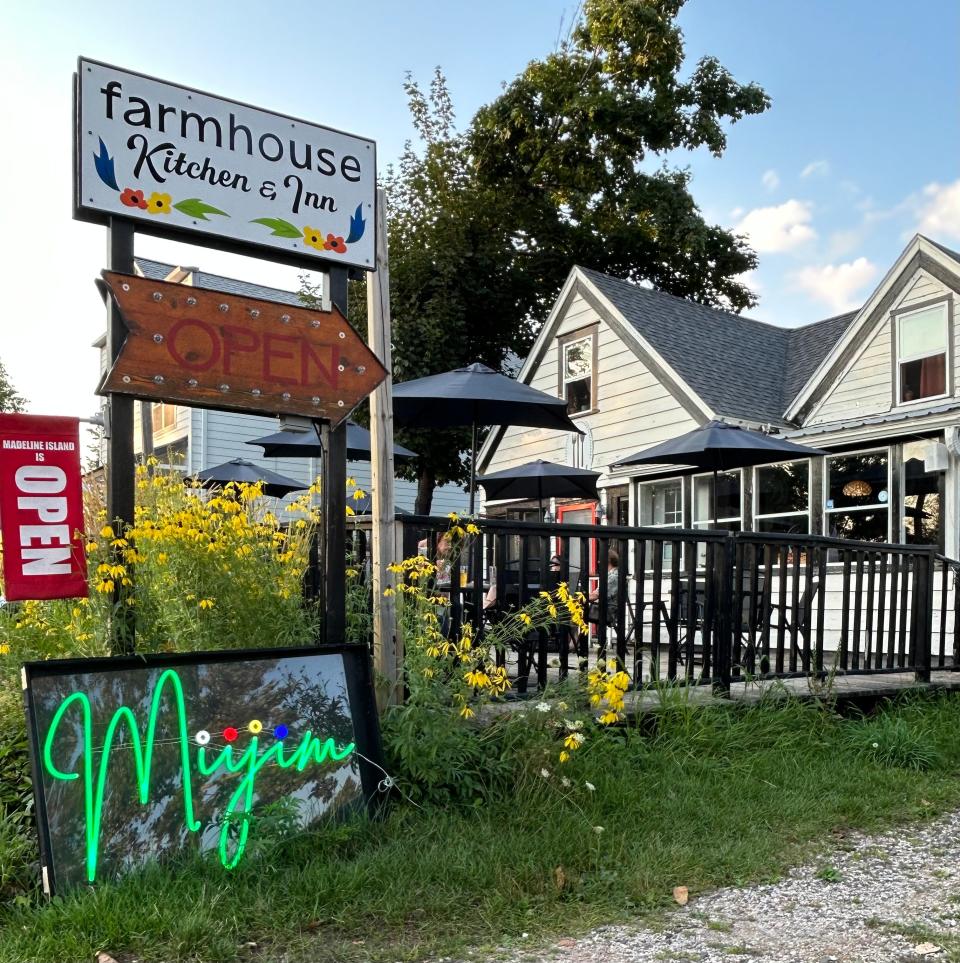
When you exit the ferry on Madeline Island, you’re greeted by a sign welcoming you to the community of La Pointe and the inscription Gidanamikaagoo omaa Mooningwanekaaning (“Welcome to Madeline Island” in Ojibwe). Take a left at the sign and Miijim is less than 50 yards away. You’ll see its green neon sign illuminated out front.
The space is quaint and cozy, with around 10 tables inside and six more on the patio. Upbeat 2000s-era hip-hop and R&B music bops softly from the speakers. It's apparent right away that while you're sitting down to elegant food and French wines, this is foremost a space of fun, not fuss. Upon arrival, chances are you’ll be met by Jessica Principali, Stevenson’s wife, co-owner of Miijim and wrangler of all things front-of-house, who’s quick with a warm welcome.
The menu at Miijim is straightforward. There are typically 10 dishes split into two categories: wiiyaasan (meat) and gitigaanensan (vegetables). It may seem simple, but the food is prepared and presented with fine-dining sophistication. Lake Superior trout is served hovering on a bed of tender indigo- and rose-colored potatoes over a silky romesco sauce. A magenta-hued plum sauce pools on a plate alongside remarkably tender venison striploin and a silo of nutty manoomin (wild rice). A heap of tepary beans, purple corn, wild rice and tart blueberries settle into the hollow of half of a roasted squash. There’s bison heart and frog legs, chanterelle mushrooms and lentils. Dessert is a cool and savory sunflower mousse topped with fresh mixed berries. Dishes are seasoned lightly, with glistening flakes of sea salt and dustings of sumac, sage, hemp seeds and calendula. They’re ingredients Stevenson calls “Ojibwe medicine.”
“The ingredients are meant to help with things like inflammation, digestion and muscle pain,” he said. “These are literal medicines, and the food they’re on top of is all good, nourishing food that’s going to help rebuild your system and make you healthier and feel well.”
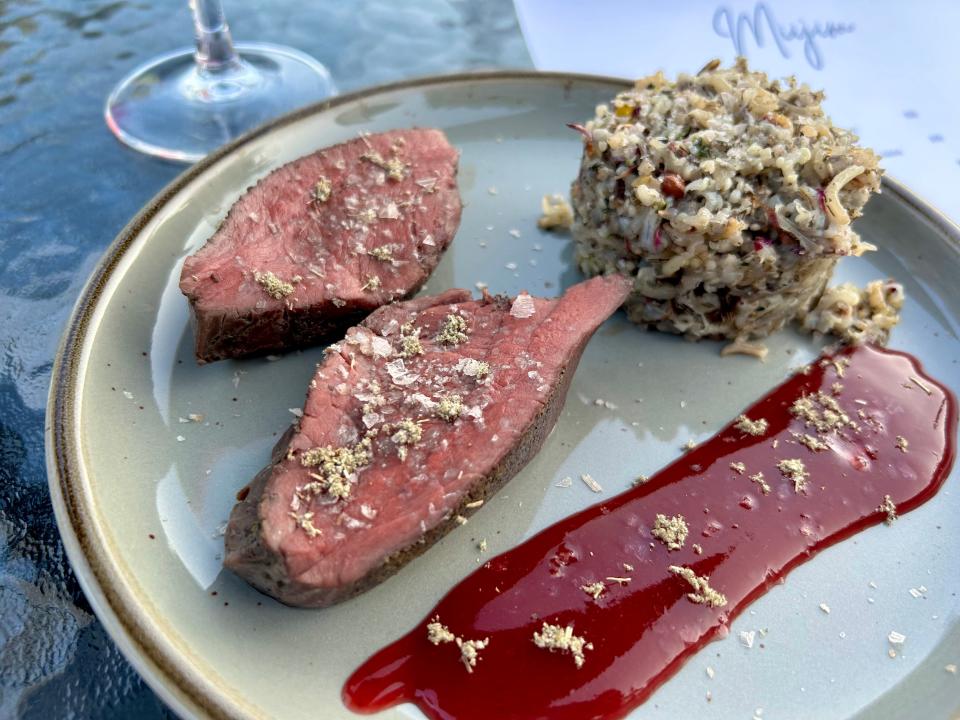
You won’t find chicken, pork or beef on the menu. No wheat, dairy or cane sugar, either. These foods aren’t native to this land and were brought here by European settlers. Not all ingredients at Miijim are indigenous, but those that aren't are meant to represent Madeline Island's blend of cultures between the Ojibwe and the French who settled there and made it a fur-trading post in the late 1600s.
The classic cooking techniques Stevenson uses impart a French soul to the food, which he says is a nod to Michael Cadotte, the prominent French-Canadian and Ojibwe fur trader, and his wife, Madeleine (Ikwesewe), who inspired the name of the island.
“The concept is an acknowledgment that our culture and people are Ojibwe, but we also literally have French in our bloodlines,” he said.
But he doesn’t ignore the dark history of the island, either, recognizing the forced removal of the tribes who originally inhabited the island for hundreds of years before Europeans arrived.
“Opening on the island is a form of taking a little of it back to the Indigenous people,” he said.
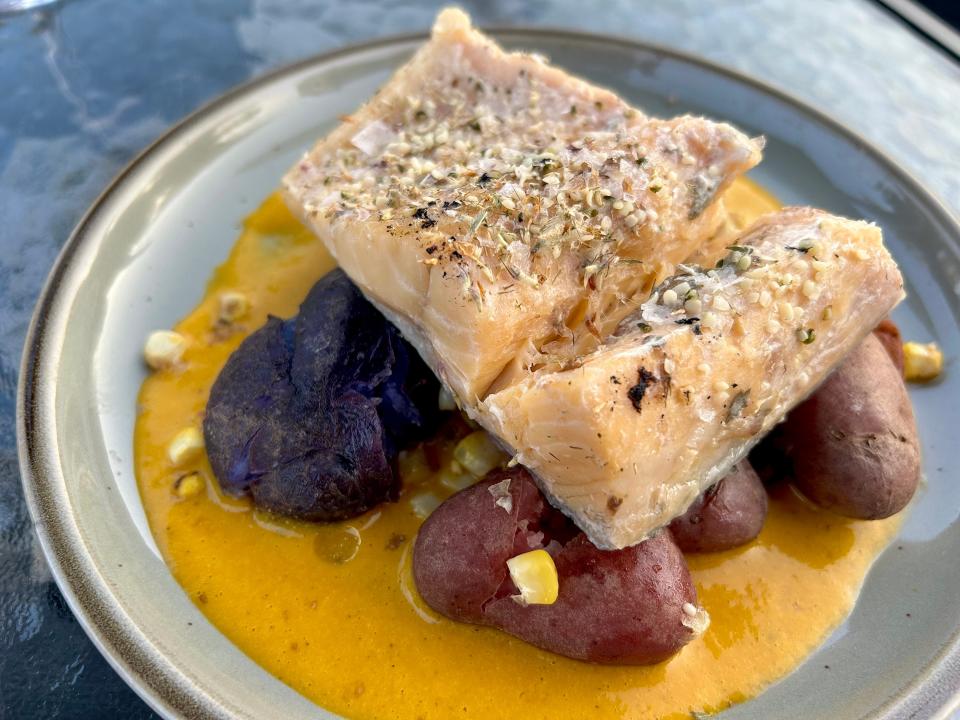
Miijim’s concept started in Milwaukee
Stevenson grew up on the Red Cliff Band of Lake Superior Chippewa reservation on the northern tip of the Bayfield peninsula. Back then, he wasn’t dreaming of a culinary career but was experimenting with cooking out of necessity.
“I remember being in first grade and cooking for my siblings because my mom was working three jobs,” he said. “It was all commodity food ... not real food ... powdered eggs and stuff like that. So I’d just throw random things together to see what I could do with it, to see if I could make what we had taste better. And I kind of credit that with how I cook now.”
He eventually moved to Milwaukee, where he first attended Milwaukee Area Technical College before transferring to the University of Wisconsin-Milwaukee to study creative writing and Indigenous studies. Around 2016, he was feeling restless with school and was looking for another outlet to focus his attention. Principali, his then-girlfriend, had recently begun working at a new Bay View restaurant called Hello Falafel, and her experience helping to open the restaurant piqued Stevenson's interest, even though he'd vowed never to work in the restaurant industry again after a stint working in fast food as a teenager.
“I took a shot in the dark and they hired me,” Stevenson said. “They were using real food made from scratch in-house, and I was just so excited. After literally two days, I knew I wanted to keep going with it and wanted to learn so much more about cooking.”
Hello Falafel (which has since closed) was owned by Ross Bachhuber and Melissa Buchholz, who also owned the restaurant Odd Duck located just around the corner at the time. Principali had moved to Odd Duck as a host, and Stevenson wasn't long behind. After a love of cooking was kindled at Hello Falafel, his sights were on the kitchen at Odd Duck, where he was eventually brought on as a prep cook and fought for a position on the line.
Bachhuber, who took a chance on Stevenson at Hello Falafel, noticed his passion from the start.
"I realized quickly he was an intelligent and insightful guy with a head for history and a clear interest in food and cooking," he said. "When the opportunity came to work on the line at Odd Duck, he jumped at it. We spent a lot of time talking about food, sourcing, history and culture, along with the day-to-day grind that makes a restaurant function. He fit right in."
While Stevenson's love for cooking was sparked at Hello Falafel, it ignited on the line at Odd Duck. “Everything felt right at that point,” he said. “I was having fun, I was good at it. Working at Odd Duck was what started everything, and I just kept pushing forward from there.”
It was then that the idea for Miijim was born.
“I came up with the name Miijim while at Hello Falafel,” Stevenson said. “Then when I was at Odd Duck, even though I’d only been cooking for around a year and a half, I had it in my head that I was ready to make it happen.”
Bachhuber knew about Stevenson's interest in Indigenous food and techniques and wanted to foster that passion. They even ran a few dishes on the menu while Stevenson was working.
"Bryce was always bringing ideas for a dish or a farm to source things from. I think seeing the dishes on the menu and having people around him respond in a positive and interested way helped him realize the idea for Miijim," he said.
Though he'd only been cooking for about a year and a half, Stevenson was ready to pursue a full-time career in cooking. With a semester left before graduation, he told Principali he was considering dropping out of school; but to her, Stevenson graduating from college meant more than just earning a degree.
"When I met Bryce, he didn't have any type of direction. He hadn't intended on going to school at all," she said. "This was more about making sure he actually finished something he started, so he could look back and see what he accomplished and worked toward before moving on to wherever he wanted to go in life."
Stevenson graduated, accomplishing one goal of earning his degree while working toward his dream. Driven to learn how kitchens operated outside of Odd Duck, Stevenson made his way into other Milwaukee-area restaurants, including Buckley’s and c.1880. Eventually he was ready to test his skills elsewhere, moving on to restaurants in the Yosemite Valley, Chicago, San Francisco and Milford, Pennsylvania, where he met mentor and friend Sean Strubb, who appointed him head chef at Hotel Fauchère, the first restaurant where he truly ran a kitchen.
Then the COVID-19 pandemic struck. Stevenson returned to Milwaukee with no restaurant job, spending time with fellow chefs and contemplating his next move. That led him to the Indigenous Food Lab in Minneapolis, where he was hired as executive chef, making and distributing food to Indigenous and underserved communities in the area. While there, he helped develop the menu of Owamni, the James Beard award-winning restaurant by Indigenous chef Sean Sherman.
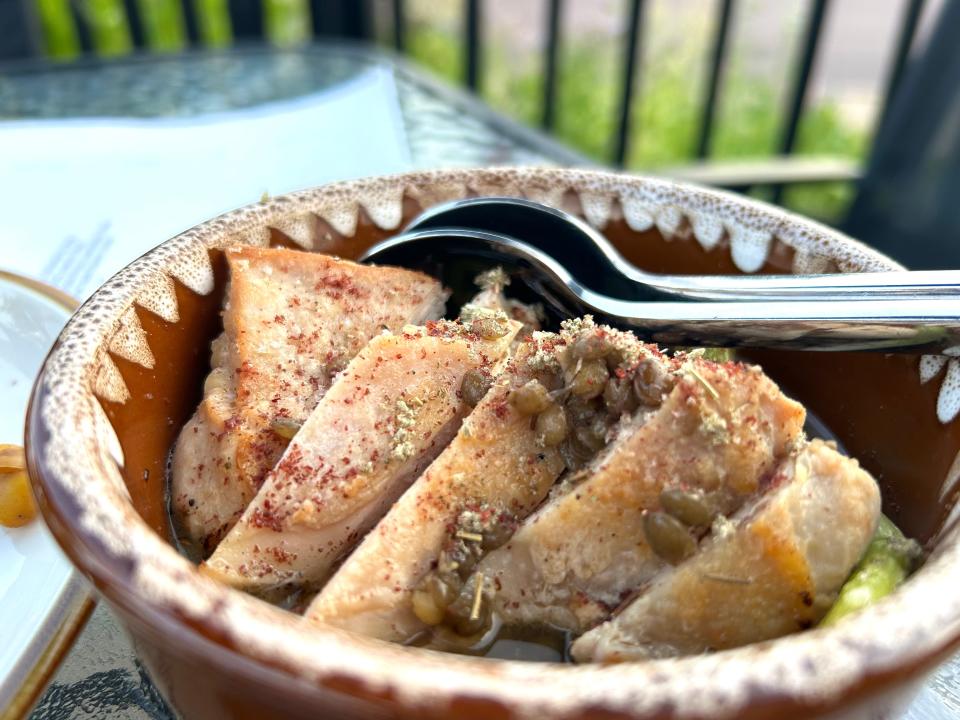
The idea of Miijim was always there, but Stevenson would have to step away from kitchen for a bit before he could pursue it. The increasingly intense stresses of working in the restaurant industry and in high-pressure kitchens wore on him, and he knew he needed a change to keep his mental health intact. Stevenson left Minneapolis to return home to Bayfield County, pausing everything to recenter and refocus his life.
But even as he attempted to put the restaurant industry out of his mind, Stevenson couldn't shake his dream. “I was still thinking about Miijim,” he said. “The whole concept was already pieced together and I was constantly thinking, oh, what if we did it this way or in this place.”
After watching his struggles in Minneapolis, Principali wrestled with the idea of him chasing his dream.
"The thought of him pursuing it made me nervous," she said. "I didn't want his prior experience to ruin him and everything he'd worked for, and I think it did in his mind for a while. He needed to find that love for it again."
About a year later, that love would be found in a restaurant on Madeline Island.
A home for Miijim on Madeline Island
Stevenson had previously run the kitchen at the island’s Farmhouse Inn & Kitchen and had built a relationship with owners Lauren Shuppe and Gilpin Matthews. When they told Stevenson they were transitioning their business away from operating a restaurant, he perked up.
“I just asked them, ‘Can I do dinner service here?’, and they immediately said, ‘Yes! That’s an awesome idea!’,” Stevenson said.
His years-long dream finally found its home near his own.
“It was always designed for me to come home and open Miijim because it was not just for me, but for my tribe and my community. I wanted something for them to feel proud about,” he said.
When learning Miijim would be opening, Stevenson's former mentor at Odd Duck felt proud, too.
"I was so excited when I heard Bryce was going to realize his vision for the restaurant," Bachhuber said. "Food, like art, is a gateway to experiencing culture and understanding our common humanity and relationship to place, so seeing Bryce be able to tell his story with his restaurant in that location is really outstanding."
The Farmhouse space underwent a quick transformation as Miijim took over. Stevenson and his team refinished the floors and bar area, and he commissioned local Indigenous artist Jess Bear Bland to add art to the space, including the restaurant’s centerpiece deer mural illuminated by a chandelier at the back of a cozy dining nook. The dining room is warm and inviting, with eclectic decor and unfussy table settings, just the way Stevenson prefers it.
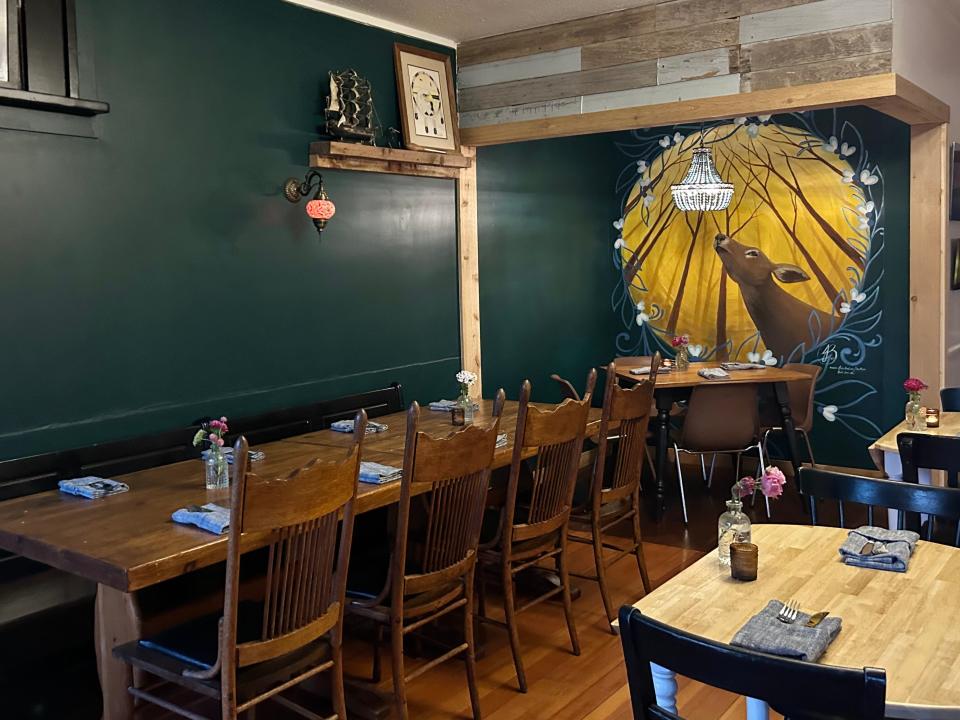
“We’re trying to make sure the restaurant speaks for itself,” Stevenson said. “I like to keep things as simple as possible. I think the dining room is really beautiful with Bear’s mural, and I have a friend who is bringing a huge collection of woodland Ojibwe art that we’ll put up all over the restaurant.”
Space limits what Miijim can do right now, but Stevenson has had a bigger dream for the restaurant from the start.
“The entire concept behind Miijim is based on creating a space in the forest with a roundhouse kitchen that has a live fire in the center. All the food would be cooked on the fire, and dining tables would circle around it,” Stevenson said. “We hold fire very sacred, and for all the medicine we’re cooking to be kissed by the Great Fire, it would just elevate everything.”
But Stevenson believes cultural education should reach far beyond the dining room. In the offseason he plans to start a nonprofit education program with his sous chef, Peter Halfaday, with the intention of creating activities for youth in nearby Bad River and Red Cliff. Expeditions would include foraging, eating the game they catch and other practices that relate to Ojibwe culture.
The plans for the youth program will be ironed out over winter, when Miijim will have to shut down due to the seasonality of operating on an island. Getting diners over to eat at the restaurant is entirely dependent on the ferry schedule, which cuts its nighttime weekend service completely by late November.
“We’ll stay open as long as we can,” Stevenson said.

Operating a restaurant on an island
The logistics of running a restaurant on the island aren’t exactly easy during the busy summer months, either.
To avoid the daily ferry fees, Stevenson and Principali travel back and forth to the island on their own boat, bringing over ingredients they shop for almost daily.
“We run all over the mainland to shop for ingredients. We’ll visit different farmers markets and growers and pack our car with as much as we can,” he said. "When we get back, we’re just exhausted by all the running around ... but I love it. I think of the planning as an art form.”
When planning for ingredients, Stevenson looks for anything that’s culturally relevant or the best the area has to offer. Their top priority is buying from Indigenous sources, such as the Cheyenne River Buffalo Company, operated by a Sioux tribe in South Dakota. After that, they attempt to get as much fresh produce as they can from local farmers. Everything they source is organic.
“You can taste a difference in ingredients that are grown on the soil you’re standing on,” he said. “That’s what makes it worth it.”
The care behind sourcing ingredients bleeds into the care behind the operation of the restaurant, where the small staff, who is predominantly Indigenous, is treated just as importantly as the food they serve.
The restaurant is only open four days a week to give its employees time to recharge, and there's an ease and support in the restaurant that's been modeled after the patience and kindness Stevenson and Principali witnessed years ago at Odd Duck.
"We saw there that kitchens don't need to be a place of toxicity," Principali said. "It stayed with Bryce, and we just want to create a similar sense of support at Miijim."
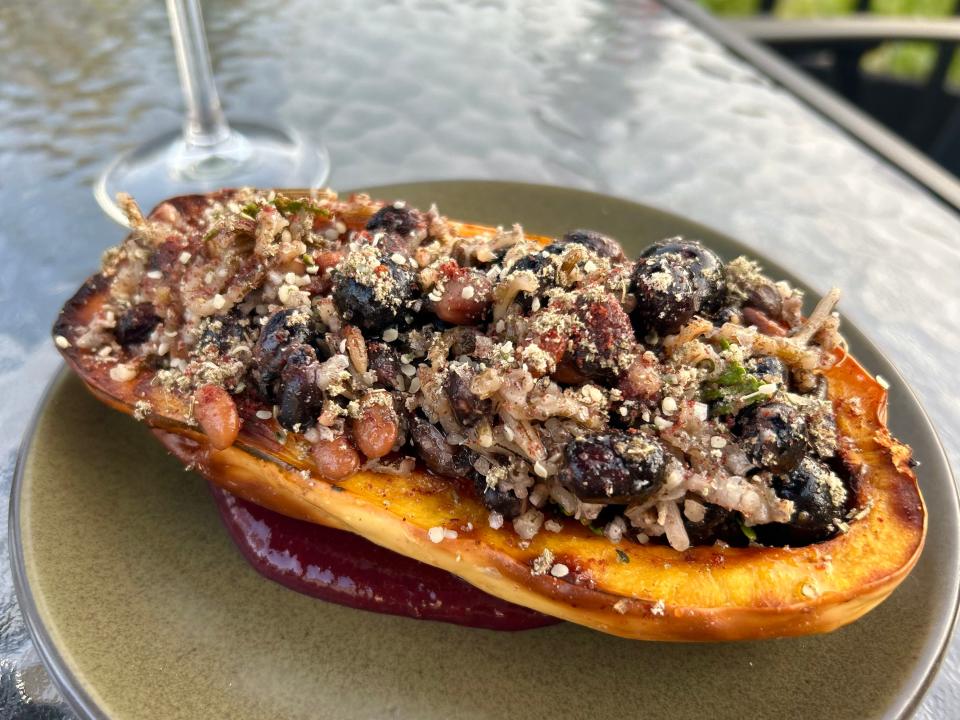
A place of culture, education and community
Miijim is a space where food is more than just what's on the plate.
"I've seen people get emotional here while dining," said Principali, recalling a story from two diners who grew up spending time on the island with their grandpa, hunting and foraging for everything they ate. "They said it reconnected them with their grandpa and reminded them of their happiest times with him."
Then there's the Indigenous people who live nearby. "They've come here and said they feel like they have a place that's theirs," Principali said. "They can come together, whether or not they're Ojibwe, and talk about their culture from their tribe. It creates a really nice sense of community."
But being a tourist area, there are of course visitors who've heard of the restaurant and dine in not knowing exactly what to expect. Miijim is just as much a space for them, too.
“A lot of people who come in have their first experience with Indigenous food here,” Stevenson said. “I’ve seen things click, and new diners who may be a little afraid of something like bison heart give it a try and say, ‘I can’t believe I’ve never eaten heart before!’ ”
He loves to witness that spark, and it’s his ultimate aim that all of Miijim’s diners leave nourished, but with a hunger for more knowledge.
“I want it to be the start of an education,” he said. “One they’ll take back home and build into something bigger.”
What to know about Miijim
Address: 858 Main St., La Pointe
More information: (715) 331-9860, miijim.com
Fare: Indigenous; game meat, vegetarian, shareable plates
Atmosphere: Relaxed, casual elegant
Hours: Open seasonally; Dinner 5 to 9 p.m. Thursday through Saturday, 5 to 9 p.m. Sunday
Prices: Meat dishes, $28-$34; vegetable dishes, $17-$19
Reservations: Can be made online; walk-ins welcome
Rachel Bernhard joined the Journal Sentinel as dining critic in June 2023. She’s been busy exploring the Milwaukee-area food scene to share her favorite finds with readers along the way. Like all Journal Sentinel reporters, she buys all meals, accepts no gifts and is independent of all establishments she covers.
What should she cover next? Contact her at [email protected]. Follow her on Twitter at @rachelbernhard or on Instagram at @rach.eats.mke.
THANK YOU: Subscribers' support makes this work possible. Help us share the knowledge by buying a gift subscription.
DOWNLOAD THE APP: Get the latest news, sports and more
This article originally appeared on Milwaukee Journal Sentinel: Madeline Island's Miijim blends Indigenous culture and fine-dining
